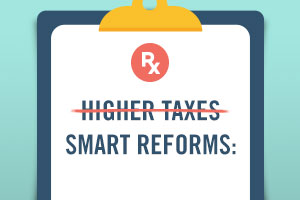Media

Tax Hikes Won’t Prevent Credit Downgrades
In July, S&P placed Pennsylvania on a negative credit watch, citing budget uncertainties. The move signaled a potential credit rating downgrade for Pennsylvania, which Governor Wolf is using to push for higher taxes.
The PLS Reporter (paywall) covered the governor's attempt to pressure the House into raising taxes:
Standard and Poor’s is threatening a downgrade and I’m trying to hold them off, but they’re looking at what goes on here and, basically, House Republicans need to get back here and get this over the finish line.
Two years ago, the governor used fear of credit downgrades to justify vetoing the 2015-16 no-tax-hike budget. Tax hikes are necessary, he thought, to stabilize Pennsylvania's fianances. Yet, tax hikes have repeatedly failed to solve the state's structural budget challenges. Plus, credit agency warnings have expressed concern over Pennsylvania’s slow economic growth, a problem that would only become worse with higher taxes.
The warnings are stark:
For example, in 2013 Fitch explained, “The Negative Outlook reflects Fitch's view that growth in fixed costs will outpace projected revenue growth, absent further action on expenses OR [emphasis added] revenues.”
Ironically, Moody’s took assurance in the “strong executive powers to control spending midyear,” a power Governor Wolf has failed to exercise.
In July 2014 Moody’s wrote, “The downgrade of the general obligation rating to Aa3 reflects the commonwealth's growing structural imbalance . . . coupled with modest economic growth will limit Pennsylvania's ability to regain structural balance in the near term.”
Ironically, Moody’s took assurance in the “strong executive powers to control spending midyear,” a power Governor Wolf has failed to exercise.
Last month S&P noted, “While it is not uncommon for states to have periodic structural imbalance, Pennsylvania’s chronic misalignment and eroding general fund position, particularly during a period of economic growth, demonstrate a pattern of financial mismanagement,”
Overcoming these budget obstacles requires redesigning state government.
Govenor Wolf certainly understands the negative impacts a credit downgrade can have on the state's residents:
If they don’t [come back to balance the budget] all Pennsylvania citizens are going to suffer.
Yet, his own solution, which requires taking more money out of the pockets of workers, would cause the kind of suffering he is seeking to avoid.
Governor Wolf claims we can’t afford a credit downgrade, but taxpayers can’t afford another $600 million tax bill.
The solution to the commonwealth's credit rating problem is spending prioritization, liquor privatization and structural welfare reforms, which would generate recurring revenue in a way that shields taxpayers from having to make cuts to their own budgets.